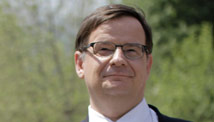North Korea manufactured this crisis

- North Korean leaders might be brutal and ruthless, but they are very rational, Lankov says
- Pyongyang leaders are impatient with "strategic patience" policy of U.S. and Seoul
- U.S. is worried about proliferation, while Seoul is concerned about the economy
- "It is also likely that in few months time the North Koreans will repeat the lesson"
Editor's note: Andrei Lankov, a historian of Korea, and a professor of Kookmin University in Seoul, has been watching North Korea for 25 years. He is the author of numerous books on Korea, North and South, including his latest North of the DMZ: Essays on Daily Life in North Korea.
(CNN) -- Yesterday afternoon, the worst artillery attack since the end of the Korean War happened in the vicinity of Seoul. North Korea shelled Yeonpyeong Island, killing two civilians and two marines, and destroying a number of buildings there.
Is this attack just another sign of Pyongyang's alleged "irrationality?" Not really. As a matter of fact, the North Korean leaders might be brutal and ruthless, but they are very rational, and always know what they are doing (and normally get what they want.)
This time, North Korean leaders merely reminded Seoul that they are capable of making a lot of trouble if their demands are ignored.
A week earlier, a similar message was delivered to Washington, albeit in a less violent manner: A group of visiting American nuclear scientists was shown a state-of-the-art uranium enrichment plant.
This is a reaction to the current U.S. policy which is known as a "strategic patience," and to somewhat similar approach of Seoul.




This policy came to dominate Washington's thinking after the second nuclear test in May 2009 which demonstrated that North Korea had not the slightest intention to surrender its nuclear program (but, perhaps would not mind freezing it at its current level if payment was good.)
In essence, the "strategic patience" policy implies that the U.S. will not provide any concessions until North Korea demonstrates its "sincere willingness" to denuclearize -- something which is not going to happen, actually.
The right-leaning government of South Korea has adopted the same approach. It decided not to increase the amount of unilateral and unconditional aid to the North -- which has grown dramatically under the earlier leftist-nationalist administrations -- unless North Korea makes some concessions, too.
Washington and Seoul expected that sooner or later the international sanctions will start making an impact on North Korea, so it will have to accept their demands and become a bit more reciprocal. Otherwise, they were in no hurry to deal with Pyongyang.
However, Pyongyang leaders have grown quite impatient with "strategic patience."
Sometimes this is explained as a testimony that sanctions are beginning to bite, but this seems to be a wishful thinking: If anything, the food situation in North Korea is better than it has ever been in the last 16 years (albeit still bad by the standards of the modern world), and the North Korean military is not short of money, as their new and shiny uranium enrichment facility demonstrated.
Nonetheless, it appears that North Korea would like to squeeze more aid from Washington and Seoul largely because they do not want to be too dependent on China which now is the nearly sole provider of aid.
So, North Korean strategists chose to hit the weakest spots of both major donors. Americans worry about proliferation, so they were shown that Pyongyang's nuclear program is advancing fast.
The South Koreans have a different vulnerability. Their efficient but outward-oriented economy depends on the whim of the international markets. Incidents like Yeonpyeong Island shelling are likely to scare markets, which damages the economy, and voters are likely to eventually blame the government for this damage.
The South Korean voters are remarkably indifferent to North Korea, but they are not going to be happy about economic troubles, so a government must know how to keep North Korean regime reasonable or face problems during the elections.
Read more on theories about the attack
It is often stated that the incident has a lot to do with the succession issue in Pyongyang. Perhaps, the unusually violent nature of shelling is indeed related to North Korea's domestic policy. Kim Jong Eun, recently promoted to four-star general, needs the support of the old generals (real ones,) so this might be his way to show himself as a tough warlord, not a spoilt brat who spent his youth in Swiss schools.
However, this is not the major reason: The succession politics might have made the incident more violent than it would be otherwise. But something like this was bound to happen.
This fits well into North Korean established pattern of actions. When Pyongyang believes that more aid and concessions can be extracted, it first manufactures a crisis and then, when tensions are sufficiently high, suggests talks in order to get paid for returning to less dangerous behavior.
Will the crisis lead to a war or prolonged confrontation? Most certainly, not, and North Koreans know it. Neither the U.S. or South Korea are going to start a war. They will win, but the price - especially for Seoul -- will be prohibitively high.
Surgical strikes against military installations will not help, either. The lives of common North Korean soldiers are expendable, and their death will have no impact on Pyongyang's policy.
So, it seems that South Koreans will bite the bullet and, after a healthy portion of the face-saving rhetoric, return to the business of usual.
But it is also likely that in few months time the North Koreans will repeat the lesson. They want to show that "strategic patience" is not an option in the long run, and they seem to be right.
The opinions expressed in this commentary are solely those of Andrei Lankov.
http://edition.cnn.com/2010/OPINION/11/24/andrei.lankov.korea/index.html?hpt=Mid
Tidak ada komentar:
Posting Komentar